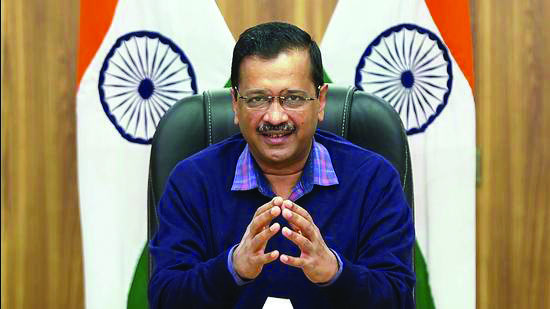After 7 yrs of work in Delhi, optimistic about win in state polls: CM Kejriwal

New Delhi: After having run a progressive government in Delhi for seven years now, which focused on education, healthcare and basic citizen services (water, power) in addition to cracking down on corruption and "abolishing caste and religious distinctions", Chief Minister Arvind Kejriwal told Millennium Post that he is optimistic about his government's work in the Capital propelling his party's performance in the upcoming Assembly elections in Punjab, Goa, Uttarakhand, and UP, adding, "AAP is certain about forming its government in Punjab".
"Today, every child in Delhi receives world-class education for free. The reverberation of the educational revolution is reaching the country and beyond. Along with education, electricity, water, and healthcare are provided at no cost to all Delhi residents, and by abolishing caste and religious distinctions, the Delhi government is allowing everyone to progress," the CM said before going ahead to list his government's work in the last seven years.
The AAP supremo said that his government's focus on education and healthcare is apparent in the qualitative improvement in school education in the Capital along with infrastructure, adding that healthcare spending is at its highest in Delhi at 16 per cent of the budget.
From building classrooms, to introducing Happiness, Mindfulness, Deshbhakti and Entrepreneurship classes to increasing student and parent participation, the CM said the work becomes apparent when surveys show that 70 per cent parents say their children's education has improved drastically.
"Today, even if an operation costs between one crocin tablet and Rs 70-80 lakh, it is provided free of charge," Kejriwal said, boasting about the Mohalla Clinics, where hundreds of medicines are free and the fact that over 200 labs in the city now provide free diagnostic tests.
"The Aam Aadmi Party discusses the fundamental issues that affect the everyday life of the common man. Today, the Kejriwal model has gained traction throughout the country as a result of his honesty in politics," the chief minister of Delhi said, speaking of citizen centric services like free water and power, adding that over 14.5 lakh people don't pay anything for water and over 30.8 lakh consumers get "zero" electricity bills. He further said that this honest politics is the reason they are able to provide dial-in doorstep delivery of as many as 300 public services.
Moreover, CM Kejriwal said that Delhi's minimum wage is now the highest in the country along with which, his government had increased old-age pensions and even provided over 2.95 lakh construction workers a minimum Rs 5,000 wage each. He went on to say that initiatives like the 2021 Startup policy, Rozgaar portal and school entrepreneurship are creating jobs like never before and that Delhi had now become the startup capital of the country.
In addition, Kejriwal said that his government's progress in developing unauthorised colonies is unparalleled even when works of all previous governments are put together. "89 per cent colonies have tap water… laid water line in 1,600, sewer line in 706… spent over Rs 8.1K crore on developing unauthorised colonies…" he said, adding that an airtight plan is also underway to clean up Yamuna by 2025.
The AAP leader said that his government here had also taken significant strides in cutting down air pollution in the Capital, saying, "We waged an all-out war... decreased pollution by 25% in 2016-18 compared to 2012-14." He also mentioned how the visionary EV policy was also a step in this direction.
CM Kejriwal said they had worked on improving women's safety in public spaces by making it one of the most CCTV-surveilled cities in the world and through schemes like free bus rides for them, which increase women's presence in public spaces and by setting up streetlights in record numbers.
Kejriwal said that his government had committed to making Delhi's per capita income equal to that of Singapore's in equitable terms so that every person - rich or poor - can have a high standard of living. Parts of this vision include a 100 per cent transition to EVs and sustainable clean air and water for all, with the CM adding all this can happen only from sustained collaboration between the government, private sector and the civil society.



